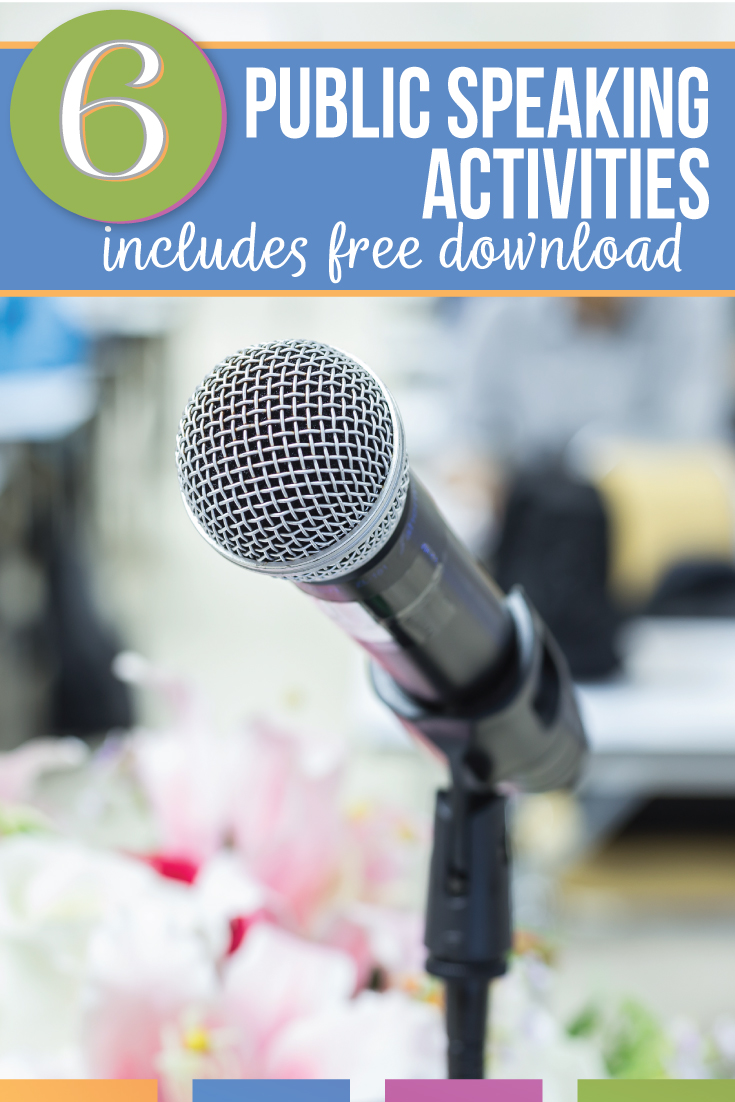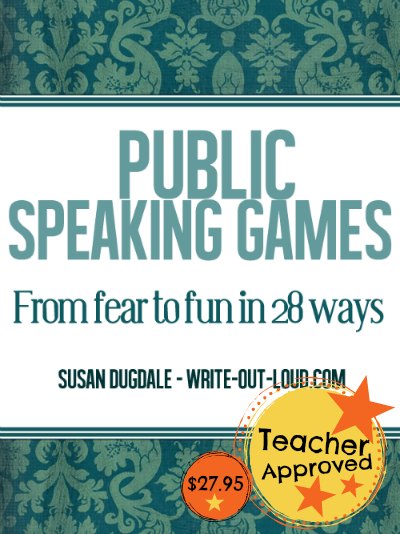Public Speaking Activities for High School
Public speaking activities for high school students can help develop their communication skills and boost confidence in expressing themselves in front of an audience. By engaging in activities such as debates, impromptu speeches, and presentations, students can learn to structure their thoughts, articulate their ideas clearly, and connect with their audience effectively.
These activities also provide opportunities for students to enhance their critical thinking, research, and teamwork skills. Public speaking activities can be incorporated into the curriculum or organized as extracurricular activities, allowing students to practice and improve their public speaking abilities in a supportive and encouraging environment.

Credit: www.marlborough.org
Benefits Of Public Speaking Activities
Engaging in public speaking activities during high school offers numerous benefits, including improved communication skills, increased self-confidence, and enhanced leadership abilities. By participating in these activities, students develop valuable life skills that can help them succeed in various educational and professional settings.
Public speaking activities in high school play a crucial role in the overall development of students. Engaging in public speaking not only helps students express themselves but also equips them with essential skills that they can utilize in various aspects of their lives.
In this section, we will explore the numerous benefits of participating in public speaking activities in high school.
Improved Communication Skills:
- Enhances verbal expression: Engaging in public speaking activities allows students to practice expressing their thoughts and ideas clearly and coherently.
- Improves non-verbal communication: Students learn to effectively use gestures, facial expressions, and body language to enhance their message delivery.
- Boosts active listening skills: Through public speaking activities, students learn to attentively listen to others and respond appropriately.
- Develops persuasive communication: Students learn the art of persuasion, understanding how to present arguments and influence others’ opinions.
Increased Self-Confidence:
- Overcoming fear: Public speaking pushes individuals out of their comfort zones, helping them conquer their fear of speaking in front of a group.
- Building self-assurance: Regular practice in public speaking activities builds self-confidence as students become more comfortable expressing themselves.
- Strong presence: Mastering the art of public speaking enables individuals to exude confidence and command attention while addressing an audience.
Enhanced Critical Thinking:
- Organizing thoughts: Public speaking activities require students to organize their ideas logically, enhancing their critical thinking and analytical skills.
- Evaluating information: While preparing speeches, students engage in research, analyze information, and distinguish between reliable and biased sources.
- Developing coherent arguments: Presenting arguments in a structured manner requires students to think critically and present their ideas in a persuasive manner.
Development Of Leadership Abilities:
- Taking initiative: Engaging in public speaking activities provides students with opportunities to assume leadership roles and take charge.
- Effective communication: Public speaking encourages students to improve their communication skills, a crucial aspect of being an effective leader.
- Empowering others: Students develop the ability to inspire and motivate their peers through persuasive speeches and presentations.
- Public representation: Public speaking enables students to represent their ideas, opinions, and perspectives, fostering their development as leaders.
By participating in public speaking activities during high school, students gain invaluable skills that extend beyond the classroom. These activities not only improve communication skills, boost self-confidence, enhance critical thinking, and develop leadership abilities but also equip students with lifelong competencies that will serve them well in their future endeavors.
So, don’t miss the opportunity to engage in public speaking activities and reap these incredible benefits!
Icebreakers And Warm-Up Activities For Public Speaking
Discover engaging icebreakers and warm-up activities specifically designed for high school public speaking. These interactive exercises will help students build confidence, improve communication skills, and create a positive learning atmosphere. Start the journey towards effective public speaking today!
Public speaking activities for high school can be a great way to help students build confidence, develop their communication skills, and overcome any fears they may have about speaking in front of others. Icebreakers and warm-up activities are essential to create a comfortable and engaging environment for students to participate in public speaking.
Here are some fun icebreaker and warm-up activities that can be incorporated into public speaking sessions for high school students:
Name Game
- Have students stand in a circle and introduce themselves by their first name, along with an adjective or noun that starts with the same letter as their name (e.g., Funny Fiona, Bold Brian).
- Each student must repeat the names and descriptions of the people who spoke before them, creating a chain of names that gets longer as more students join in.
Two Truths And A Lie
- Students take turns sharing two true statements and one false statement about themselves.
- The rest of the group must try to guess which statement is the lie by asking questions or using their intuition.
Would You Rather
- Create a list of thought-provoking and humorous “Would You Rather” scenarios related to public speaking or general topics.
- Each student takes turns selecting a scenario and explaining their choice to the group, encouraging open discussion and debate.
Story Starter
- Provide each student with a sentence or a short paragraph to use as a story starter.
- Students will take turns continuing the story, either by adding a sentence or passing it on to the next person, building a collaborative narrative.
Fun Facts
- Ask each student to prepare and share an interesting or surprising fact about themselves.
- This activity helps students get to know each other better and provides opportunities for improvisation and impromptu speaking.
By incorporating these icebreakers and warm-up activities into public speaking sessions, high school students can feel more comfortable, engaged, and ready to tackle the challenges of public speaking. These activities also serve as a platform for students to express their thoughts, build relationships, and develop essential public speaking skills.
Debates And Persuasive Speaking Exercises
Discover engaging debates and persuasive speaking exercises specifically designed for high school students. These public speaking activities will help them enhance their communication skills and build confidence in expressing their opinions effectively.
Public speaking skills are essential for high school students to develop as they prepare for the future. Engaging in debates and persuasive speaking exercises can greatly enhance their ability to articulate their thoughts and convince others of their viewpoints. In this section, we will explore various activities that can help students improve their skills in debates and persuasive speaking.
Establishing Arguments:
- Clearly define the main argument: Before engaging in any debate or persuasive speech, it is crucial to establish a clear and concise main argument.
- Provide supporting evidence: Backing up arguments with relevant evidence helps strengthen the persuasive impact and credibility of the speaker.
- Use logical reasoning: Presenting logical reasoning allows students to make engaging and persuasive arguments that are grounded in sound logic.
Counterarguments And Rebuttals:
- Anticipate opposing viewpoints: Encouraging students to consider opposing viewpoints allows them to address potential counterarguments effectively.
- Develop rebuttal strategies: Teach students to identify potential weaknesses in opposing arguments and develop strong rebuttals to counter them.
- Encourage critical thinking: Foster critical thinking skills by challenging students to think on their feet and respond to counterarguments in real-time.
Structuring Persuasive Speeches:
- Teach students to start with a captivating opening that grabs the audience’s attention and clearly states the main argument.
- Main body: Help students organize their main points in a logical and coherent manner, using clear subheadings or transitions to guide the flow of ideas.
- Encourage students to summarize their main points and leave a lasting impression on the audience by reinforcing the main argument.
Practice Debates On Relevant Topics:
- Choose topics of interest: Selecting relevant and engaging topics that resonate with the students encourages active participation and lively debates.
- Research prior to the debate: Encourage students to conduct thorough research on the chosen topic to gather supporting evidence and strengthen their arguments.
- Facilitate structured debates: Create a structured debate format where students take turns presenting arguments and engaging in respectful discourse.
By engaging in debates and persuasive speaking exercises, high school students can develop essential communication, critical thinking, and persuasion skills that will benefit them in various aspects of their lives. These activities not only help them become effective public speakers but also enable them to analyze different perspectives and present their ideas confidently.
Improving Impromptu Speaking Skills
Improve your impromptu speaking skills with engaging public speaking activities designed for high school students. Enhance your ability to think on your feet and communicate effectively in various situations.
Public Speaking Activities For High School:
Are you a high school student looking to enhance your impromptu speaking skills? Whether you’re preparing for debates, presentations, or simply want to become a more confident speaker, practicing impromptu speaking can greatly benefit you. In this section, we will explore some exciting activities and games that can help you think on your feet and improve your impromptu speaking skills.
Let’s dive in!
Quick Thinking Exercises:
- Word association: Choose a random word and quickly associate it with another word that comes to mind. Practice speaking about the association for 30 seconds to a minute to improve your ability to speak on a topic without prior preparation.
- Picture interpretation: Look at a random image or photograph and deliver a short impromptu speech about what you see. This exercise helps sharpen your observational skills and encourages you to think and speak spontaneously.
Spontaneous Speech Topics:
- Current events: Stay informed about the latest news and practice speaking about current events without prior preparation. Discuss topics such as politics, sports, science, or entertainment for a set amount of time.
- Debate topics: Select a debatable topic, formulate arguments in support of or against it, and deliver an impromptu speech defending your position. This activity enhances your critical thinking skills and ability to formulate persuasive arguments on the spot.
Impromptu Speaking Games:
- Just a minute: Give each participant a random topic to speak about for one minute without any prior preparation. Evoke creativity and quick thinking while maintaining coherence and clarity within the given time frame.
- Story continuation: Start a story with a few sentences, then pass it on to the next person who continues the narrative. Each participant must think quickly and adapt to the developing story, ensuring smooth transitions and logical storytelling.
Remember, the key to improving your impromptu speaking skills is consistent practice and pushing yourself out of your comfort zone. By engaging in these quick thinking exercises and impromptu speaking games, you’ll develop your ability to speak confidently and coherently on any topic that comes your way.
So go ahead, step up, and conquer impromptu speaking like a pro!
Group Activities For Collaborative Public Speaking
Discover engaging group activities that foster collaborative public speaking skills in high school students. With interactive exercises and dynamic discussions, students can improve their presentation skills while engaging with peers in a supportive and creative environment. Gain confidence and master the art of public speaking through these innovative group activities.
Public speaking is a valuable skill that high school students need to develop. It can boost their confidence, enhance their communication abilities, and prepare them for future professional opportunities. Group activities that focus on collaborative public speaking can be particularly beneficial, as they provide students with opportunities to work together, share ideas, and learn from each other’s experiences.
In this blog post, we will explore three effective group activities for collaborative public speaking: panel discussions, role-playing scenarios, and team presentations. Let’s dive in and discover the exciting possibilities of these activities!
Panel Discussions:
- Panel discussions are a dynamic way for students to engage in collaborative public speaking. They allow a group of students to share their opinions, knowledge, and experiences on a specific topic, while also encouraging active listening and critical thinking.
- Dividing students into panels and assigning them specific roles or topics ensures that each student actively contributes to the discussion.
- Each panelist should have an opportunity to express their viewpoint, followed by open discussions and thoughtful questions from both the panelists and the audience.
- Panel discussions not only develop public speaking skills but also foster teamwork, empathy, and respect for diverse opinions.
Role-Playing Scenarios:
- Role-playing scenarios can be a fun and interactive way for high school students to improve their public speaking skills. Through role-playing, students can step into the shoes of different characters and practice presenting their ideas, arguments, or solutions.
- Assigning specific roles and scenarios prompts students to think on their feet and develop their communication skills.
- Encouraging active listening and open-mindedness among participants can lead to engaging and thought-provoking discussions.
- Role-playing scenarios not only enhance public speaking abilities but also cultivate empathy, creativity, and problem-solving skills.
Team Presentations:
- Team presentations provide an excellent opportunity for students to collaborate, plan, and deliver meaningful speeches together. Working in a team helps distribute the workload and allows students to combine their strengths and expertise.
- Assigning specific roles within the team, such as a speaker, researcher, visual designer, or timekeeper, fosters a sense of responsibility and dedication.
- Students should work collaboratively to create a clear and engaging presentation, ensuring that each team member has a chance to contribute to the overall message.
- Team presentations not only improve public speaking skills but also nurture teamwork, organization, and effective communication within a group.
By incorporating these group activities into high school public speaking programs, educators can create an engaging and impactful learning environment. Each activity offers unique benefits and opportunities for students to develop their public speaking abilities, collaborate effectively, and grow as confident communicators.
So, why not encourage your students to explore these activities and unleash their potential? The world is waiting to hear their voices!
Creative Activities To Enhance Public Speaking
Enhance your high school students’ public speaking skills with engaging and innovative activities that stimulate creativity and boost confidence. From impromptu speaking challenges to storytelling competitions, these activities encourage students to express their ideas effectively and captivate an audience.
Public speaking is a valuable skill that can greatly benefit high school students both academically and professionally. Engaging in creative activities can make the learning process more enjoyable and help students develop confidence in their public speaking abilities. Here are three creative activities that can enhance public speaking skills:
Storytelling Exercises:
- Encourage students to immerse themselves in the world of storytelling to enhance their public speaking skills.
- Have them practice storytelling by narrating their favorite childhood story or creating their own imaginative tale.
- Students can incorporate gestures, facial expressions, and vocal variations to bring their stories to life.
- Utilize storytelling techniques such as vivid descriptions, compelling characters, and engaging plotlines to captivate the audience.
Poetry Recitation:
- Poetry can be a powerful tool for developing public speaking skills and cultivating a love for literature.
- Provide students with a selection of poems and encourage them to choose one that resonates with them.
- Through recitation, students can focus on voice modulation, rhythm, and intonation to create an engaging performance.
- Encourage them to explore the emotions and themes within the poem, using gestures and facial expressions to convey meaning effectively.
Improvisation Games:
- Improvisation is an exciting and effective way to enhance public speaking skills while fostering creativity and teamwork.
- Organize improvisation games that require students to think on their feet, such as “Yes, And…” or “Build a Story.”
- These games encourage students to develop quick thinking, effective communication, and confident delivery.
- By participating in improvisational activities, students can learn to adapt to unexpected situations and improve their ability to engage an audience.
Engaging in these creative activities will provide high school students with an opportunity to explore different aspects of public speaking while building their confidence. Through storytelling exercises, poetry recitation, and improvisation games, students can develop essential skills that will serve them well in their future endeavors.
Mastery of public speaking will not only enhance their academic performance but also prepare them for success in various professional settings. So why wait? Embrace these creative activities and see your public speaking skills soar!
Mock Interviews And Presentation Practice
Enhance public speaking skills in high school with engaging mock interviews and presentation practice sessions. Build confidence, improve communication, and develop effective presentation techniques in a supportive environment.
Public speaking is an essential skill for high school students to develop, as it builds confidence, enhances communication abilities, and prepares them for future academic and professional endeavors. One effective way to improve public speaking skills is through mock interviews and presentation practice.
These activities provide students with valuable opportunities to refine their speaking abilities in a supportive and structured environment.
Interview Simulations:
- Conducting mock interviews allows students to practice their communication and interviewing skills.
- Students can prepare for college admissions, scholarship interviews, or job interviews.
- Mock interviews help students become familiar with typical interview questions and how to respond effectively.
- Feedback from teachers or professionals can provide valuable insights into areas for improvement.
- Receiving constructive criticism helps students identify their strengths and weaknesses, enabling them to refine their interviewing techniques.
Presentation Feedback And Improvement:
- Students can practice delivering presentations in front of their peers and teachers.
- This activity helps students become more comfortable speaking in front of an audience.
- Feedback from classmates and teachers allows students to refine their presentation skills.
- Students can learn from observing and evaluating others’ presentations.
- Peer evaluations can provide a different perspective and offer helpful suggestions for improvement.
Mock interviews and presentation practice provide students with valuable opportunities to strengthen their public speaking skills in a simulated environment. These activities help students become more confident, improve their communication abilities, and prepare for future academic and professional pursuits. By participating in these exercises and receiving feedback, students can refine their interviewing and presentation techniques, setting themselves up for success in various aspects of life.
Overcoming Fear Of Public Speaking
High school public speaking activities can help students overcome their fear of speaking in front of others. These activities provide a supportive environment for students to practice and build confidence, preparing them for future speaking engagements.
Public speaking can be intimidating, especially for high school students who may have limited experience with it. However, with the right strategies, anyone can overcome their fear of public speaking. Here are some effective techniques to help you conquer your fear and become a confident speaker:
Visualization Techniques:
- Imagine yourself giving a successful speech: Visualize yourself standing in front of an audience, confidently delivering your speech with clarity and poise.
- Picture positive feedback: Envision your audience applauding, nodding in agreement, and engaging with your words. Visualizing positive reactions can boost your confidence and reduce anxiety.
Gradual Exposure To Public Speaking:
- Start with smaller speaking opportunities: Begin by speaking in front of family or friends, where the audience is comfortable and supportive. This will help you gain confidence and become familiar with the experience.
- Participate in class discussions: Engaging in classroom dialogues can ease your fear of speaking in front of your peers. Take part in group discussions and build your confidence gradually.
Positive Affirmations:
- Practice positive self-talk: Repeat positive affirmations such as “I am a confident speaker” or “I have valuable insights to share.” Remind yourself of your abilities and focus on your strengths rather than dwelling on potential mistakes.
- Use visualization techniques in conjunction with affirmations: Combine positive affirmations with visualizing successful speech delivery. This powerful combination can help overcome self-doubt and build confidence.
Supportive Environments:
- Join a public speaking club: Engaging with like-minded individuals who are also working on their speaking skills can provide a supportive and encouraging environment. Consider joining a club like Toastmasters to practice and receive constructive feedback.
- Surround yourself with supportive friends: Seek out friends who will encourage and support your public speaking endeavors. Having a strong support system can help alleviate anxiety and provide reassurance.
Remember, overcoming fear of public speaking takes practice and patience. By implementing these techniques and gradually exposing yourself to speaking opportunities, you can develop confidence and become a proficient public speaker. Embrace the challenge, believe in your abilities, and watch yourself grow into a confident communicator.
Using Technology For Public Speaking Practice
Looking to improve your public speaking skills in high school? Utilize technology for practice sessions, leveraging tools such as video recording apps or online speech platforms. Develop confidence and fluency in your communication through these innovative techniques.
Public speaking skills are essential for high school students to develop. Not only do these skills help improve their communication abilities, but they also build confidence and self-assurance. In today’s digital age, technology can play a crucial role in honing public speaking skills.
Here are some exciting activities that utilize technology for public speaking practice:
Video Recording And Self-Assessment:
- Record your speeches: Use a smartphone or webcam to record yourself giving a speech. This allows you to analyze your performance and identify areas for improvement.
- Focus on body language and gestures: Pay attention to your posture, facial expressions, and hand movements. These nonverbal cues can significantly impact how your speech is perceived.
- Analyze speaking pace and tone: Listen to your recorded speech and assess whether you vary your speaking speed and tone appropriately. This helps you engage your audience and convey your message effectively.
- Evaluate content and message delivery: Assess the clarity of your speech, organization of ideas, and overall message. Look for ways to strengthen your arguments and enhance your speech’s impact.
Online Public Speaking Courses:
- Learn from experts: Enroll in online public speaking courses, where experienced instructors provide valuable guidance and tips on various aspects of effective communication.
- Access a variety of resources: Online courses offer a wealth of resources, such as video lessons, tutorials, and practice exercises. These resources provide comprehensive learning opportunities beyond traditional classroom settings.
- Receive personalized feedback: Many online courses provide opportunities for feedback, allowing you to submit recordings or written assignments for evaluation. This personalized feedback helps you understand your strengths and areas for improvement.
- Practice with interactive exercises: Engage in interactive activities, such as simulated debates or impromptu speaking exercises. These exercises foster quick thinking and adaptability, essential skills for public speaking.
Virtual Reality Simulations:
- Immerse yourself in realistic speaking scenarios: Virtual reality simulations offer an immersive experience, allowing you to practice public speaking in realistic settings, such as conference rooms, auditoriums, or even TED-like stages.
- Experiment with various audience types: Virtual reality simulations enable you to practice speaking to diverse audiences, including formal, informal, or even hostile groups. This helps broaden your adaptability and communication skills.
- Receive real-time feedback: Some virtual reality programs provide instant feedback on your speaking skills, including vocal variety, eye contact, and gestures. This immediate feedback allows for continuous improvement.
- Repeat and refine: Virtual reality simulations allow you to rehearse multiple times and refine your speeches. With practice, you can build confidence and polish your delivery.
These technology-driven activities provide high school students with valuable opportunities to practice and improve their public speaking skills. Whether through video recording, online courses, or virtual reality simulations, embracing technology can enhance their communication abilities and boost their confidence on stage.
So, why not leverage technology to unlock your full potential as a public speaker?
Assessing Public Speaking Skills
Discover effective public speaking activities for high school students that help assess and improve their speaking skills. Engage in interactive exercises and group discussions to build confidence and fluency in communicating ideas. Develop crucial presentation abilities for academic success and future endeavors.
Public speaking skills are essential for high school students as they prepare for their future endeavors. It is important to assess these skills to provide valuable feedback and help students grow. Here are some effective methods for assessing public speaking skills:
Rubrics For Evaluating Speeches:
- Clear organization: Speeches should have a logical structure with a clear introduction, body, and conclusion. Ideas should flow smoothly and transitions should be seamless.
- Content: Assess whether the speaker demonstrates a thorough understanding of the topic and effectively communicates key points. Look for evidence of research and supporting evidence.
- Delivery: Evaluate the speaker’s voice projection, clarity, and overall presence. Are they engaging and confident in their delivery?
- Body language: Assess the speaker’s use of gestures, facial expressions, and body posture. Do they make effective eye contact with the audience?
- Time management: Determine if the speaker effectively manages their time and adheres to any time limits given.
- Audience engagement: Look for signs that the speaker is connecting with the audience through eye contact, varying vocal tone, and their ability to keep the audience’s attention.
Peer Evaluations:
- Pair students: Assign students to pairs to evaluate each other’s speeches. This can provide a fresh perspective and encourage constructive feedback.
- Guidelines for evaluations: Provide guidelines or a rubric for students to follow when evaluating their peers. Encourage them to provide specific examples and suggestions for improvement.
- Anonymous feedback: Consider making evaluations anonymous to create a safe environment where students can provide honest feedback without fear of judgment.
Growth Mindset Approach:
- Focus on improvement: Emphasize the importance of growth mindset, where students view public speaking as a skill that can be developed with effort and practice.
- Constructive feedback: Encourage students to see feedback as an opportunity for growth rather than criticism. Teach them how to give and receive feedback in a constructive and supportive manner.
- Goal setting: Help students set realistic goals for improving their public speaking skills. Breaking down the skill into smaller, achievable goals can boost motivation and show progress over time.
By using these methods, educators can effectively assess and provide feedback on high school students’ public speaking skills. This approach promotes growth mindset and encourages students to improve their abilities in this vital area.
Frequently Asked Questions For Public Speaking Activities For High School
What Are Some Benefits Of Public Speaking Activities For High School Students?
Public speaking activities help high school students build confidence, improve communication skills, and enhance critical thinking abilities. These activities also promote self-expression, develop leadership skills, and prepare students for future academic and professional endeavors.
How Can Public Speaking Activities Be Incorporated Into High School Curriculum?
Public speaking activities can be integrated into the high school curriculum by including debates, presentations, and speeches as part of various subjects. Teachers can also organize public speaking competitions or create a public speaking club to encourage students to develop their speaking skills.
Are There Any Resources Available For Organizing Public Speaking Activities In High School?
Yes, there are many resources available such as online platforms, books, and workshops that provide guidance and materials for organizing public speaking activities in high school. These resources offer tips, speech topics, and techniques to help teachers and students effectively plan and execute engaging public speaking activities.
Conclusion
Public speaking is a crucial skill for high school students to develop, as it prepares them for future success in their personal and professional lives. By actively participating in various public speaking activities, students can enhance their communication skills, boost their confidence, and improve their overall self-esteem.
Engaging in activities such as debate competitions, presenting in front of classmates, or joining a public speaking club allows students to practice articulating their ideas clearly and persuasively. Furthermore, these activities provide an opportunity for students to develop critical thinking skills, research abilities, and the ability to structure and deliver a compelling argument.
Overall, the benefits of participating in public speaking activities in high school are undeniable. They not only equip students with the skills necessary to excel academically and professionally but also empower them to overcome their fear of public speaking and become effective communicators.
So, encourage high school students to embrace these activities and witness the tremendous growth and development they can achieve.




